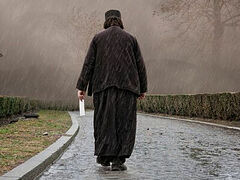Brothers and sisters, let’s talk about the topic of holiness and the sanctification of man. This is fundamental to the Christian life. First, I’d like to emphasize that spiritual reality surpasses any attempts at systematization since it concerns the free and sovereign actions of the Holy Spirit, Who bloweth where it listeth (Jn. 3:8). The Holy Spirit sanctifies man and all of creation according to the Divine economy, which we can never fully understand and which we are even less able to fit into a rational structure.
We should always be aware of attempts at rigid systematization in theology, for the letter killeth, but the spirit giveth life (2 Cor. 3:6). The Russian theologian Vladimir Lossky once said: “As soon as you create a system, immediately destroy it, so you don’t become a slave to this system. God is beyond all expression and any system. Unfortunately, we’re often slaves to our own systems, our own traditions and ideas about God.” By the word “spirituality,” we mean the Christian life as a whole, the meaning and purpose of which is the sanctification of man in the ontological unity of body, soul, and spirit: May the very God of peace sanctify you wholly (1 Thess. 5:23).
For the Orthodox faithful, the term “spirituality” means the same thing as life in Christ or life in the Holy Spirit. “Sanctification” and “theosis [deification]” have the same meaning for us. The Romanian theologian Protopresbyter Dumitru Stăniloae said that “theosis is nothing but the highest degree of humanization of a human being.” In a state of sin, man lives below the level of his humanity, or even rebels against it.
The Orthodox spiritual tradition and spirituality, although deeply influenced by monasticism, is nevertheless the same for all members of the Church. When Christ says in the Sermon on the Mount: Be ye therefore perfect, even as your Father Which is in Heaven is perfect (Mt. 5:48), He appeals to all Christians, regardless of their status in the Church, be they laymen, clerics, or monastics. Nevertheless, monastics have always made special efforts to live up to the Gospel maximum and have thereby become living role models for the laity. That’s why most of the spiritual and edifying writings that the laity follow are written by monastics—profound experts on the human soul.
The Holy Fathers of the Church teach us that the grace of Baptism is hidden in the human heart. However, these Fathers also say something contradictory. On the one hand, they say that “everything is grace” in our life, and on the other hand, they demand: “Give blood and receive the Spirit.” A spiritual man knows from his own experience that life in Christ transcends human logic. He also knows that faith is, in fact, the crucifixion of reason over its natural way of judging things. The above is contradictory from the point of view of logic, but true from the point of view of faith.
You can find Biblical evidence for each of these statements. Thus, in the epistle of the Apostle Paul to the Ephesians, it says: For by grace are ye saved through faith; and that not of yourselves: it is the gift of God (Eph. 2:8). In another place, we read: For it is God Which worketh in you both to will and to do of His good pleasure (Phil. 2:13). The Apostle Matthew writes: And from the days of John the Baptist until now the Kingdom of Heaven suffereth violence, and the violent take it by force (Mt. 11:12).
And more examples: Ye have not yet resisted unto blood, striving against sin (Heb. 12:4); Enter ye in at the strait gate: for wide is the gate, and broad is the way, that leadeth to destruction, and many there be which go in thereat (Mt. 7:13). Great discernment is needed to combine these two fundamental truths. Yes, there is the action of the Holy Spirit. But the words, “Give blood and receive the Spirit,” mean the cooperation of man in the redemptive work of God. For we are labourers together with God: ye are God’s husbandry, ye are God’s building (1 Cor. 3:9).
In the holy Sacrament of Baptism, we receive the fullness of grace and are sanctified. However, this sanctification demands our cooperation through participation in the Holy Sacraments of the Church. This especially concerns the Eucharist. What’s important is our personal desire and effort to reject the passions and be sanctified; that is, we have to make an ascetic effort. The grace hidden in the heart can only manifest itself to the extent that a man cleanses himself from everything that separates him from God. A purified heart is sensitive to God’s presence. It’s impossible to achieve this without ascetic efforts, that is, without prayer, without restraint in food and drink and moderation in everything, without effort to constantly do good and separate from evil. The Holy Fathers say that the goal of asceticism, even in its extreme forms, isn’t the mortification of the body, but the mortification of the passions. Its purpose is the spiritualization of the body and matter, and not their destruction.
Unlike the spirit of modernity that tries to deny sin until the notion disappears completely, the tradition of the Eastern Church adheres to a very realistic view of the theological concept of sin. The Church sees sin as man’s desire for autonomy in relation to God and his rebellion against the order that God has established in nature and in all of creation. The Holy Fathers consider sin as a disease deeply rooted in human nature. If left untreated, it leads to a man’s spiritual death, and consequently, to eternal death. As we know, the term διάβολος [diabolos] in Greek means the one who divides, separates, destroys unity, and sows discord.
Sin, as the work of the devil, destroys the inner unity of man, the harmony of his powers. It deforms human relationships, closes man up within himself, and alienates him from God and others. Therefore, a man in a state of sin can’t have peace of heart. Repeated sin becomes a passion, a bad habit. Through passion, man loses his freedom and becomes a slave to sin: Verily, verily, I say unto you, Whosoever committeth sin is the servant of sin (Jn. 8:34). And the wages of sin is death (Rom. 6:23), with the full range of diseases and sufferings that precede it.
Due to the ontological unity of mankind, both sin and virtue have their consequences not only for the man himself, but also for those around him (family, close friends, and so on), and therefore, for all of mankind. There’s a causal relationship between sin, sickness, and suffering, and between virtues and health. Sin weakens human nature, while virtue strengthens and heals it. We can also understand genetic inheritance and various hereditary diseases in the same way: Thou shalt not bow down thyself unto them, nor serve them: for I the LORD thy God am a jealous God, visiting the iniquity of the fathers upon the children unto the third and fourth generation of them that hate Me, And shewing mercy unto thousands of them that love Me and keep My commandments (Deut. 5:9-10). If this is accepted without resistance, with faith, then it becomes the basis of salvation and man’s sanctification; for suffering accepted with faith awakes a sense of repentance in men, and repentance sanctifies men. The Holy Fathers say that suffering endured joyfully and with an awareness of one’s sinfulness cleanses one more than any ascetic feats.
Inasmuch as sanctification is exclusively a gift of God, the Holy Fathers give no method for achieving it. However, they recommend ways to overcome the passions and fight with sin. Of course, overcoming the passions is in the end a work of the grace of God or a gift of God. No one can overcome his passions without striving, without constant and persistent efforts in this fight. The process of overcoming the passions lasts a lifetime. And during this time, the knowledge of our sinfulness and a sense of contrition and regret for our sins grows in our hearts. That is, we become more aware of our sinfulness and feel the need for repentance more.
Repentance is the greatest virtue, which keeps us in a state of humility—without which, as the Holy Fathers say, none can draw near to God. No Christian can say during his lifetime that he’s achieved the necessary level of holiness or progress in his sanctification. On the contrary, if a man is truly close to holiness, he belittles himself, realizes his sins and attributes everything good in his life to God. Such a man feels responsible for the evil in this world, and like Christ, takes everything that happens in it to heart, trying to reduce this evil with his prayer and asceticism.
Monastics are especially called by God to sanctify themselves through repentance and asceticism. Because nothing helps the world more than personal sanctification. “Acquire a spirit of peace, and thousands around you will be saved,” said St. Seraphim of Sarov (†1833). A monk withdraws from the world into solitude, into his heart. We know from monks that true prayer is performed by the mind united with the heart. The mind, or nous, is the energy of the heart, which can be prevented from scattering only when it descends into the heart. Prayer involving only the rational mind isn’t complete prayer. Only the prayer of the heart truly pacifies and sanctifies a man.






